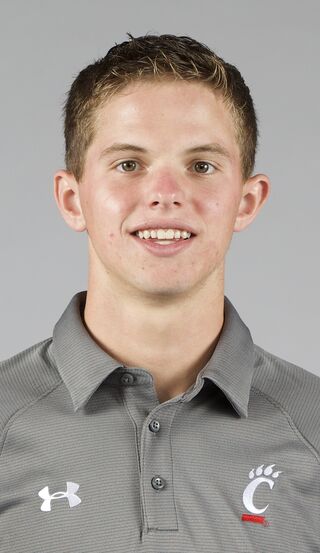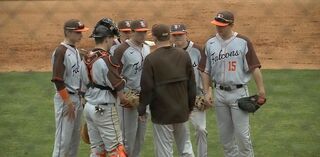Play
College Sports Apocalypse
The personal impact on athletes when their college sports team is dropped.
Posted June 15, 2020
COVID-19 has rocked collegiate athletics. Canceled seasons, slashed budgets, and locked-out training facilities have hit hard. Some athletes have endured the cruelest punch of all—the permanent elimination of their teams.
According to Sports Illustrated, 30 Division-I teams, alone, have been cut—with many more likely to follow at all levels—in the wake of the three-month coronavirus financial tsunami crashing over college sports.
What’s it like having your college athletic team unexpectedly ripped away?
Let’s have a listen from the horses’ mouths.

Emotional Impact
“It was devastating,” shared the University of Cincinnati (UC) mid-fielder Kyle Healy, about his Bearcat soccer program being cut on April 14, 2020. “We had no idea they were going to shut it down."
“I felt frozen—a lot of people felt frozen,” continued Healy—a UC honor student. “Honestly, everyone was stunned. You could see it on the faces (of his teammates) on the Zoom call. They just couldn’t believe it.”
Yes, the news was delivered on a Zoom call—nice touch.
“After the call, it didn’t really hit me until I walked upstairs from the basement (of his parents’ house)," said Healy. “Emotions started running high. It was so unexpected; it just hurt when they told us. Sadness hit. I’m never going to be able to play for, or represent, Cincinnati again."
“It might have been better if we (teammates) were all together,” said Healy. “It was kind of like you were all alone going through this. Kind of felt like the program died.”
Healy is not alone in his reaction.

Bowling Green (BG) baseball freshman infielder Nathan Rose and his Falcon teammates learned their program was eliminated during a May 15, 2020, Zoom meeting.
“Everyone was in shock,” described Rose, a Bowling Green honor student. “Everyone was shaking their heads. The faces went dark, guys taking their faces off the (Zoom) call. Right after I hung up—when the meeting ended—it hit me right away. The emotions just set in right after that."
“It was one of the toughest things I’ve ever heard,” Rose continued. “Losing my teammates—my brothers—I’ve been with for the last 10 months. My heart just sank when I realized that we’d never play together again, and we’d never be together again in the Fall like we were expecting."
“I was sad and angry—I felt a little bit of everything,” reflected Rose. “No one expected it, either. It was just out of the blue.”
Collegiate Athletics Are Different
Less than 10 percent of high school athletes go on to compete in college, so it’s difficult for most people to relate to the collegiate athletic experience. College athletics is a far more intense experience than high school or youth sports. Part of that intensity stems from being away from home and a more involved relationship with teammates.
“As soon as we came on campus in August, and had a team meeting, I felt like I was part of the brotherhood,” Rose explained. “We spent every day together. We practiced together, lived together, and ate together. So, basically, it was my second family. My home away from home.”

Healy shared similar observations. “One of the worst things about this (the cancellation of his team) is that I may never see these guys (teammates) again,” said Healy, an American Athletic Conference Soccer Freshman-of-the-Week (9-9-2019). “One of the things that made me love Cincinnati so much was the relationships I made. All those teammates had such a great connection."
“In college, you’re with your teammates all day, sometimes in classes, and just walking through campus together,” he explained. “We have films, we have practices, games, and we travel together. You do all those things with your high school team, but I feel like it’s twice as much with your college team."
“We always wanted the best for each other, Healy said. “When something good happened for somebody, we always got excited for them. There was no selfish stuff, like in high school. There’s more maturity with college kids. They keep their emotions in check.”
Youth and high school athletes often let their emotions get in the way, which can interfere with effective team cohesion, not to mention team and individual success.
“In high school, you see kids getting really mad when they strikeout or something,” observed Rose, “but in college, the game’s not going to wait for you. If you don’t move on, you’re not going to be successful. You have to clear your past.”
Excellent point, Mr. Rose. The ability to move on is a must for success at any level of sport, not just college.
After the Fall—Move On
Quite an emotional ride for Healy and Rose, but no time to waste. Both put their misfortune quickly behind them, entering the NCAA transfer portal to seek college athletic opportunities elsewhere.
“I was sad and angry for about two hours or so,” Rose recalled, “and then I realized I was going to have to find somewhere else to go. So, I started calling my coaches from previous years. Since it’s gone and not coming back (the baseball program), I had to figure out a way to get over it—as much as I could get over it—so I can move on to my next step.”
Turns out, it did come back, and his next step is Bowling Green.
BG decided to bring back baseball on May 25 after an aggressive fundraising effort by Falcon baseball alumni to save the financially strapped program. Amongst Bowling Green alumni leading the charge were Columbus Clippers Manager Andy Tracy and former Major League pitcher Orel Hershiser.
During the 10-day interlude between the death and rebirth of Bowling Green baseball, Rose received interest from over 50 college teams, entertaining several enticing offers, before deciding to return to BG.
Things are still up in the air for Kyle Healy. He has a few solid offers and plans to make a final decision within the next few weeks. There is a Cincinnati soccer alumni fundraising effort to save that program, but not in time for the 2020-21 academic year.
“I’m just trying to focus on moving forward and focus on the next chapter,” Healy said. “Cincinnati was such a great opportunity and such an exciting part of my life that I’m just going to be grateful for it and keep moving on.”
“I’ve got to do this all over again and bond with all these different people again,” He continued. “I realize that was one of the most fun parts—meeting new players, meeting new people, creating new friendships.”
“Wherever I go to play college soccer, I feel like it’s a new opportunity to play. It will be a new area, new people, and a new team. Looking forward to that helps me to move forward and not look back at it,” Healy reasoned.
Move on with purposeful action—a great lesson for all of us.
Kyle Healy and Nathan Rose are a pair of college freshmen demonstrating an approach highlighted by outstanding resilience, and leadership by example, traits coveted by coaches in all sports.
You’ve got to feel good about the future of these two guys, wherever life happens to take them.




